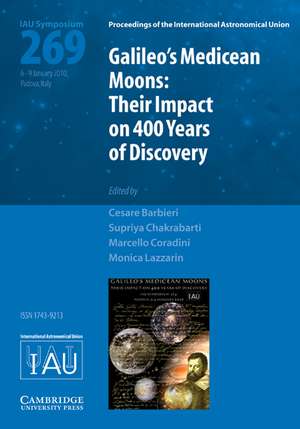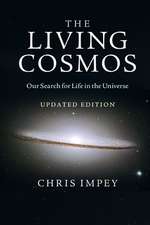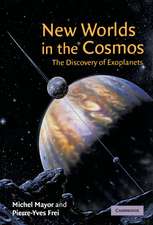Galileo's Medicean Moons (IAU S269): Their Impact on 400 Years of Discovery: Proceedings of the International Astronomical Union Symposia and Colloquia
Editat de Cesare Barbieri, Supriya Chakrabarti, Marcello Coradini, Monica Lazzarinen Limba Engleză Hardback – 24 noi 2010
Din seria Proceedings of the International Astronomical Union Symposia and Colloquia
- 11%
 Preț: 574.15 lei
Preț: 574.15 lei - 9%
 Preț: 938.41 lei
Preț: 938.41 lei - 14%
 Preț: 890.72 lei
Preț: 890.72 lei - 11%
 Preț: 543.82 lei
Preț: 543.82 lei - 9%
 Preț: 750.00 lei
Preț: 750.00 lei - 14%
 Preț: 806.43 lei
Preț: 806.43 lei - 9%
 Preț: 653.38 lei
Preț: 653.38 lei - 14%
 Preț: 857.94 lei
Preț: 857.94 lei - 14%
 Preț: 801.52 lei
Preț: 801.52 lei - 9%
 Preț: 831.65 lei
Preț: 831.65 lei - 14%
 Preț: 890.72 lei
Preț: 890.72 lei - 14%
 Preț: 762.08 lei
Preț: 762.08 lei - 14%
 Preț: 1003.55 lei
Preț: 1003.55 lei - 9%
 Preț: 865.29 lei
Preț: 865.29 lei - 14%
 Preț: 767.48 lei
Preț: 767.48 lei - 14%
 Preț: 723.92 lei
Preț: 723.92 lei - 14%
 Preț: 758.75 lei
Preț: 758.75 lei - 14%
 Preț: 1005.20 lei
Preț: 1005.20 lei - 14%
 Preț: 733.02 lei
Preț: 733.02 lei - 9%
 Preț: 837.10 lei
Preț: 837.10 lei - 14%
 Preț: 803.10 lei
Preț: 803.10 lei - 9%
 Preț: 834.50 lei
Preț: 834.50 lei - 14%
 Preț: 803.10 lei
Preț: 803.10 lei - 14%
 Preț: 732.21 lei
Preț: 732.21 lei - 14%
 Preț: 728.90 lei
Preț: 728.90 lei - 14%
 Preț: 892.36 lei
Preț: 892.36 lei - 14%
 Preț: 856.30 lei
Preț: 856.30 lei - 14%
 Preț: 887.40 lei
Preț: 887.40 lei - 9%
 Preț: 591.53 lei
Preț: 591.53 lei - 11%
 Preț: 705.69 lei
Preț: 705.69 lei - 11%
 Preț: 692.39 lei
Preț: 692.39 lei - 14%
 Preț: 781.24 lei
Preț: 781.24 lei - 11%
 Preț: 566.60 lei
Preț: 566.60 lei - 14%
 Preț: 798.00 lei
Preț: 798.00 lei - 11%
 Preț: 636.59 lei
Preț: 636.59 lei - 14%
 Preț: 763.16 lei
Preț: 763.16 lei - 11%
 Preț: 515.49 lei
Preț: 515.49 lei - 14%
 Preț: 736.74 lei
Preț: 736.74 lei - 11%
 Preț: 574.15 lei
Preț: 574.15 lei - 11%
 Preț: 627.19 lei
Preț: 627.19 lei - 11%
 Preț: 522.77 lei
Preț: 522.77 lei - 7%
 Preț: 516.24 lei
Preț: 516.24 lei - 11%
 Preț: 671.02 lei
Preț: 671.02 lei - 11%
 Preț: 649.47 lei
Preț: 649.47 lei - 11%
 Preț: 657.11 lei
Preț: 657.11 lei - 11%
 Preț: 689.01 lei
Preț: 689.01 lei - 14%
 Preț: 685.49 lei
Preț: 685.49 lei - 11%
 Preț: 654.28 lei
Preț: 654.28 lei - 11%
 Preț: 651.69 lei
Preț: 651.69 lei
Preț: 531.85 lei
Preț vechi: 597.58 lei
-11% Nou
Puncte Express: 798
Preț estimativ în valută:
101.78€ • 105.87$ • 84.03£
101.78€ • 105.87$ • 84.03£
Carte tipărită la comandă
Livrare economică 14-28 aprilie
Preluare comenzi: 021 569.72.76
Specificații
ISBN-13: 9780521195560
ISBN-10: 052119556X
Pagini: 296
Ilustrații: 150 b/w illus. 20 tables
Dimensiuni: 178 x 252 x 16 mm
Greutate: 0.66 kg
Ediția:New.
Editura: Cambridge University Press
Colecția Cambridge University Press
Seria Proceedings of the International Astronomical Union Symposia and Colloquia
Locul publicării:Cambridge, United Kingdom
ISBN-10: 052119556X
Pagini: 296
Ilustrații: 150 b/w illus. 20 tables
Dimensiuni: 178 x 252 x 16 mm
Greutate: 0.66 kg
Ediția:New.
Editura: Cambridge University Press
Colecția Cambridge University Press
Seria Proceedings of the International Astronomical Union Symposia and Colloquia
Locul publicării:Cambridge, United Kingdom
Cuprins
Preface; 1. Galileo's telescopic observations: the marvel and meaning of discovery George V. Coyne, S. J.; 2. Popular perceptions of Galileo Dava Sobel; 3. The slow growth of humility Tobias Owen and Scott Bolton; 4. A new physics to support the Copernican system. Gleanings from Galileo's works Giulio Peruzzi; 5. The telescope in the making, the Galileo first telescopic observations Alberto Righini; 6. The appearance of the Medicean Moons in 17th century charts and books. How long did it take? Michael Mendillo; 7. Navigation, world mapping and astrometry with Galileo's moons Kaare Aksnes; 8. Modern exploration of Galileo's new worlds Torrence V. Johnson; 9. Medicean Moons sailing through plasma seas: challenges in establishing magnetic properties Margaret G. Kivelson, Xianzhe Jia and Krishan K. Khurana; 10. Aurora on Jupiter: a magnetic connection with the Sun and the Medicean Moons Supriya Chakrabarti and Marina Galand; 11. Io's escaping atmosphere: continuing the legacy of surprise Nicholas M. Schneider; 12. The Jovian Rings Wing-Huen Ip; 13. The Juno mission Scott J. Bolton and the Juno Science Team; 14. Seeking Europa's ocean Robert T. Pappalardo; 15. Europa lander mission: a challenge to find traces of alien life Lev Zelenyi, Oleg Korablev, Elena Vorobyova, Maxim Martynov, Efraim L. Akim and Alexander Zakahrov; 16. Atmospheric moons Galileo would have loved Sushil K. Atreya; 17. The study of Mercury Louise M. Prockter and Peter D. Bedini; 18. Jupiter and the other giants: a comparative study Thérèse Encrenaz; 19. Spectroscopic and spectrometric differentiation between abiotic and biogenic material on icy worlds Kevin P. Hand, Chris McKay and Carl Pilcher; 20. Other worlds, other civilizations? Guy Consolmagno, S. J.; 21. Concluding remarks Roger M. Bonnet; Posters; Author index; Object index.
Recenzii
'these critical reviews examine our present knowledge of the Jupiter system and consider how future space missions and improvements in telescopes will bolster the contemporary vision of our Solar system, of the many known extrasolar planetary systems and of life forms beyond the Solar system.' Spaceflight
'This volume is an excellent summary of the scientific history and studies of the Jovian system, and a reminder of how important Galileo's discovery was in shaping our present-day view of the Universe.' The Observatory
'This volume is an excellent summary of the scientific history and studies of the Jovian system, and a reminder of how important Galileo's discovery was in shaping our present-day view of the Universe.' The Observatory
Descriere
IAU S269 examines the current vision of our Solar System, in light of Galileo Galilei's astronomical discoveries 400 years ago.










